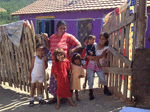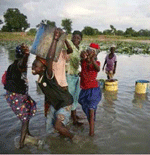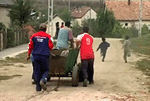Social Watch News
Published on Thu, 2013-06-20 09:08

Family in Blazevo, Novi Pazar,
Serbia. (Photo: UNDP)
|
Serbia’s lack of any long-term vision or commitment as well as any comprehensive development strategies, make it difficult to counter the negative impact of the global economic crisis and establish a solid basis for economic growth, including increased jobs and livelihoods. In this context, with weak democratic institutions and lacking the rule of law, that the MDGs are unlikely to be achieved by 2015. There is thus a strong need to change the current neoliberal economic development paradigm to one that will focus on achieving human development for all.
The latest phase of the Serbian transition to a market economy, started in 2001, was not modelled with a clear vision of achieving economic prosperity and improved livelihoods for all, but focused on the livelihoods of those with economic and political power. Due to the high level of corruption, the lack of effective economic and social policy, and the absence of long-term vision and multisectoral strategies, Serbia cannot counter the consequences of the economic crisis and establish a solid basis for economic growth, one that can increase employment, salaries, livelihoods and quality of life.
|
Published on Thu, 2013-06-20 05:11

Women fetching water. (Photo:
African Agenda)
|
The July 2012 election of Nkosazana Dlamini-Zuma to the position of Chair of the African Union represented not only a milestone in the continental body's history, but it also an affirmation that African women occupying leadership positions had come a long way since the Organization of African Unity was established 50 years ago.
At the time of independence, despite being part and parcel of the different liberation struggles and being members of parliament, in a number of countries, and holding ministerial positions in countries like Ghana and Guinea, there was no similar effort to ensure women's voices were heard at continental level with the establishment of the OAU. And whereas voices such as Dr. Kwame Nkrumah of Ghana were posing questions such as “What part can the women of Africa and the women of African descent play in the struggle for African emancipation?”, the Charter of the OAU had no reference to women or the roles they could play, or how the institution could support their advancement or address focus on gender as well as actively ensuring issues of gender equality.
|
Published on Wed, 2013-06-19 10:11
Whether in the realm of environmental oversight, subsidies and tax abatements, consumer labeling and protection, or financial regulation, the human rights impacts of corporate lobbying are extensive. In the United States, much has been made of the impact of campaign financing on elections following the Citizens United ruling by the US Supreme Court in 2010. The ruling ostensibly paved the way for vastly increased financial contributions to political action committees, commonly known as ‘Super-PACs’. But while Citizens Unitedsensitized the public once again to the role of money in elections, this issue has been around for a long time and plays a very big role in the realization of human rights.
|
Published on Tue, 2013-06-18 21:43
The International Movement ATD Fourth World cordially invites you to the panel discussion titled Knowledge from experience: Building the Post-2015 Agenda with People living in Extreme Poverty.
This event is the conclusion to a two-day seminar giving people living in poverty and international development actors in the UN arena the opportunity to exchange ideas on an equal footing. The seminar forms part of ATD Fourth World’s participatory research conducted along-side its grassroots members.
The panel will consist of three sessions chaired by four ambassadors and will include keynote speeches from development stakeholders, academics and people living in poverty. ATD Fourth World will release the results of the participatory research and, participants will then discuss recommendations on the most effective means to deliver a sustainable development framework “that leaves no one behind”.
|
|
Published on Fri, 2013-06-14 08:54
|
Published on Fri, 2013-06-14 00:00

Protest in Venezuela.
(Photo: PROVEA.)
|
The achievements in the fight against poverty that income statistics attribute to the government of Venezuela since 1999 are overshadowed by violence and insecurity that impede the full exercise of the rights to education, health, recreation and enjoyment of public spaces. Constitutional and legal reforms since 2008 represent another setback following the progress of basic rights in the first presidency of Hugo Chavez, by centralizing political power, restricting participation and democratic freedoms and pluralism, and increasing militarization of society. At the same time, the authorities insist on the criminalization of social protest and human rights.
The significant decline in poverty began during the administrations of President Chavez but stagnated in his second term (2007-2013). The reduction, which had been 16.4% between 2004 and 2006, was only 1.8% in the next four years.
|
Published on Wed, 2013-06-12 00:00

Photo: UN Photo/Rick Bajornas
|
The World Health Organization's head, Dr Margaret Chan, has heavily criticized how big business influences public health by way of a combination of lobbying, litigation and misleading representations of research. Dr Chan's remarks were part of her address to the 8th Global Conference on Health Promotion, held in Helsinki, Finland. Comments such as those made by Dr Chan are rather unusual for UN officials, raising the level of concern with regard to the relationship between public health and big business.
|
Published on Wed, 2013-06-12 00:00
From People's Rights to Corporate Privilege: A South Feminist Critique of the HLP Report on Post 2015 Development Agenda
The High Level Panel of Eminent Persons Report on the Post 2015 Development Agenda conveys a questionable sense of optimism for women. The report at first appears to have positively responded to the world-wide call from women to have a stand-alone and expanded gender equality goal. There are targets for gender, children and young people across several of the goals, as well as possibilities for indicators on gender, children and young people to be later developed at country level. Sexual and reproductive health and rights is also explicit.
|
|
Published on Thu, 2013-06-06 16:56
|
Published on Thu, 2013-06-06 00:00

Roma in Hungary. (Photo: OHCHR).
|
In Hungary a system has developed that is disrespectful to both the rule of law and constitutionalism. Hungary has turned against the democratic ideals of the world, civil liberties are restricted and today it is on a declining economic path. Political life is characterized by a murderous policy divergence, confrontation and a dangerous ideology-based polarization. The majority of the society is struggling with unjust and unequal relationships without even the hope offered by mutual solidarity. Hungary's international prestige, integrity and credibility are now at its lowest point.
|
SUSCRIBE TO OUR NEWSLETTER
Submit

|










